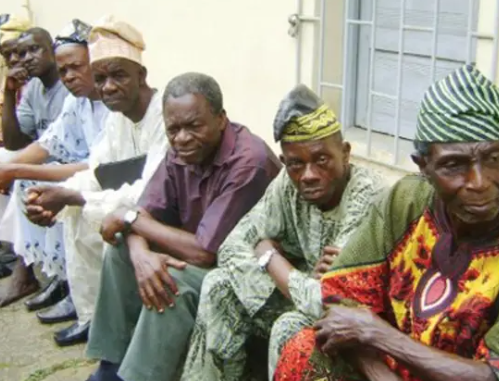
- Over a year has passed since there was a payment; legally required upward review suspended for 15 years; stakeholders demand a boycott of government securities;Consistent communication and labor pressure are needed – PenOp

Since the federal government has not released funds for the payment of accrued pension rights in the first half of 2024, or H1’24, which ended yesterday, the suffering of Federal Civil Service retirees seems to be becoming worse.
Since no money was given despite budgetary provisions, the FG had broken their promise for the entire year 2023, or FY’23.
The release pertaining to unpaid invoices from 2022 was issued during the first quarter of 2023.
This occurs in the context of FG’s 15-year failure to carry out its policy of reviewing pension levels under the Contributory Pension Scheme (CPS) upward, in violation of the law’s mandated policy of reviewing pension amounts every five years.
Although the legislation requires that pensions be evaluated every five years or in conjunction with any federal civil service salary reviews, whichever comes first, the FG has not made any adjustments to pensions under the Contributory Pension Scheme (CPS) since the scheme’s launch in 2004.
An estimated N230 billion has been owed by the FG to pensioners on accumulated pension rights over the last 16 months.
Given that the majority of the government’s borrowing originates from pension assets, certain pensioner organizations have called for a boycott of investing pension assets in FG securities. Simultaneously, the FG has consistently been deemed noncompliant with the current pension program.
accumulated privileges
A worker’s accumulated rights are their benefits for the years they worked before to June 2004, when the Pension Reform Act (PRA), which gave rise to the Contributory Pension Scheme (CPS), took effect.
As per the findings of a report published by the National Pension Commission (PenCom), the Forestry Commission (FG) disbursed N100.29 billion in 2021 to settle accrued rights, bringing the total amount released by the FG since its establishment to N980.18 billion.
The FG released N14.92 billion in March 2022 to cover accrued rights.
PenOp, the Pension Fund Operators Association of Nigeria, claims that although the FG has released monies through February 2023, no further payments have been issued.
Experts claim that since the 2024 Appropriations Act reduced the amount allocated for pensions, gratuities, and retiree benefits by 21.3%, there would inevitably be a delay in the availability of cash for the payment of accrued entitlements.
The 2024 Appropriations Act states that the N854.81 billion planned for Pensions, Gratuities, and Retiree Benefits in 2023 was reduced to N673.01 billion.
Additionally, according to Financial Vanguard inspections, since the CPS was established in 2004, more than 60% of pension assets have been invested in FGN equities.
Subsequent investigation reveals that, of the N19.7 trillion total assets in the pension fund as of the first quarter of 2024, Q1’24, 62.03 percent were invested in FGN securities totaling N12.2 trillion.
Subsequent investigation reveals that, of the N18.4 trillion total assets in the pension fund, 64.94 percent was invested in federal government securities in Q4 of 23.
Experts’ and stakeholders’ perspectives
As per Mr. Olumide Oyetan, the CEO of Stanbic IBTC Pension Managers Limited, the last time the federal government issued cash for pensioners to be paid their accrued benefits was in February 2023.
“Funds were last released in February 2023, however approval has been made for March and April, but no money has been released,” stated Oyetan.
Oluwakemi Ugwu, the Chief Executive Officer of Nigerian University Pension Management Company Limited (NUPEMCO), also made a speech in which she stated: “If you retire and you are not paid your benefits, the purpose of the CPS is defeated.”
“To make sure that the money is not wired to other government needs once it is there, we need supporting legislation.”
Senator Fasuyi Oluwole, the chairman of the Senate’s Committee on Establishments and Public Service, also spoke, arguing that people ought to receive their retirement benefits when they retire.
“PenCom should give us an estimate for the next five years as well as the total amount of outstanding accrued benefits so that we know how to pursue it from the government,” he stated.
“At the National Assembly, we want to make sure that people receive their money when they retire. At the time of retirement, pension payments should be made; if they aren’t, then we aren’t doing anything.
“Whatever the case, we must address these accumulated benefits so that our people won’t suffer in the future, using whatever means necessary.”
The Contributory Pensioners Union of Nigeria (CPUN), Ibadan Branch President, Mr. Amao Shittu, bemoaned the state of affairs and added that the FG’s callous disregard for the suffering of retirees is shocking.
“The situation is extremely appalling because lawmakers are taking millions of dollars every month,” he stated. The CPS was established by former President Obasanjo with the intention of ensuring benefits would not be delayed; sadly, this is not the case.
Additionally, FG just provided palliatives to employees but not to retirees. We are not taking advantage of anything that goes against the CPS’s goals, which include allowing seniors to enjoy their retirement and receiving benefits when they are due.
Even the pension-receiving pensioners did not receive their payout this month until after the Sallah holidays, even though it was due before the vacations.
Therefore, we insist that any benefits owed to retirees under CPS be paid immediately.
In a separate speech, Mr. Olufemi Odewabi, the Chairman of the Lagos State Chapter of the Association of Retired Federal Senior Public Officers of Nigeria, or ARFESPON, declared that it is a crime against humanity for retirees to fail to pay their accumulated rights even after they have retired.
“FG has been told repeatedly to check into the situation of retirees and to pay pension arrears immediately, but these requests have been met with silence.
Some retirees who would have had access to health care are denied it because of the waiting period, which causes them to pass away too soon. Nigerians are lucky to live longer than 70 years, therefore they have outlived their mortality, but they still have to wait an average of a year to get their money. This is just pitiful.
Speaking about the situation, Mr. Ivor Takor, Executive Director of the Center for Pension Rights Advocacy, said: “It is well known that federal public employees frequently retire and must wait a long time—sometimes up to a year or longer—before getting their benefits.
“The Act’s goal of timely retirement benefit payment is clearly at odds with this payment delay. It highlights structural problems with the way the government is implementing the CPS, problems that require immediate fixing.
“These delays affect the financial security of retirees and weaken public confidence in the government’s ability to uphold its legal duties and the pension system.
The second concern relates to the constitutional clause that increases pensions. “Pensions shall be reviewed every five years or together with any federal civil service salary reviews, whichever is earlier,” states Section 173(3) of the 1999 Constitution (as modified).
By neglecting to execute pension adjustments for retirees under the CPS, the administrations of Goodluck Jonathan and Muhammadu Buhari violated Section 173(3) of the Constitution and Section 39(3) of the Pension Reform Act of 2014. Sadly, President Tinubu’s administration has continued along the same road, disobeying the rights of CPS pensioners as specified by these important legal frameworks.
It is clear from the aforementioned cases that the CPS is not being completely implemented by the federal government.
As a result, assets held by pension funds in bonds, sukuk, or other federal government-issued debt instruments should never have been made.

“It’s possible that the federal government believed it would completely execute the CPS as required by law, which is why the federal government was left off of PenCom’s Regulation on Investment of Pension Fund Assets in Section 2.8.
“Reality, however, shows otherwise, as evidenced by delayed pension payments and other difficulties faced by pensioners.
“Investing pension funds in instruments linked to firms that aren’t completely compliant with CPS implementation raises concerns,” the statement reads.
However, Mr. Donald Onuoha, Managing Director of Fidelity Pensions, and the Head of the Media Committee of the Pension Fund Operators Association of Nigeria, PenOp, stated that it might not be the best course of action to boycott federal government securities because it might not help holders of retirement savings accounts.
According to Onuoha, the main responsibility of pension fund administrators is to find values for their clients.
“PFAs will seize the chance to enhance consumers’ savings, for instance, if the government offers an instrument for 21%.
“RSA holders should not benefit, in my opinion, from a boycott of investing in federal government securities.
But cooperation and engagement ought to be effective. As an industry, we may take the following actions: we can interact more with the government, particularly the minister of finance, and all other pertinent parties who could assist in resolving the issue; we can also include the TUC and the Nigerian Labour Congress.
Every Nigerian worker is a member of the TUC or NLC, thus they have the power to put some pressure on the government to act morally.
Boycotting investments made in federal government securities won’t help us solve the issue; at best, it will provide a brief reprieve.
Therefore, it is appropriate to interact and work with the government more. The Lagos state government’s success only indicates that Nigeria’s accumulated rights issue can be resolved with the correct kind of leadership and teamwork.

Be the first to comment